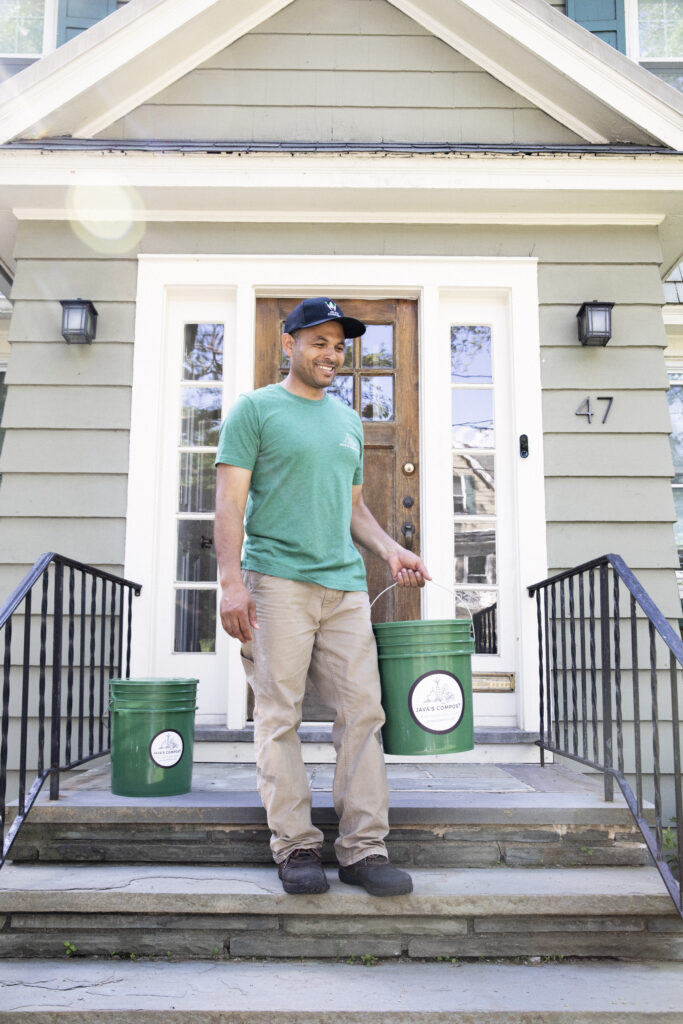
Going Green is Easy with Java’s Compost
This month, we talked to Java and Michelle Bradley, the West Orange duo behind Java’s Compost. While they don’t cook at Garden State Kitchen, they are here in spirit every day. Last month, we were one of the first businesses to sign up for their new green waste pick-up service. We are proud to report that our makers’ food scraps now turn into nutrient-rich soil instead of going into the trash. We couldn’t be happier!
How Exactly Does Java’s Composting Service Work?
Three years ago, Java and Michelle started setting up compost systems at homes and schools, and teaching residents how to do it themselves. Their new pick-up service is what we have at the kitchen. “It’s designed to make composting easy and mess-free,” Michelle says.
It’s simple. During kitchen prep, makers drop fresh food scraps into the green Java’s Compost buckets at each station. Java and Michelle collect the waste once a week and take it to an industrial processing site where it’s turned into rich, dark dirt. Twice a year, customers can receive a small amount of finished compost to spread around their gardens. In addition, Java and Michelle share extra compost from their residential program with urban farms in Newark and East Orange. Either way, our local food cycle keeps rolling.

Changing the Way People Think About Trash
Michelle says she and Java try to get potential customers to rethink garbage. “People don’t really think about what happens to their food when they put it in the trash,” she says. “We try to get people to understand that food scraps are a resource that has value – why not redirect it and process it into something that is useful?”
Michelle wasn’t always convinced. As a native New Yorker, the idea of reusing food waste was not as intuitive to her as it was to Java who grew up in eco-friendly San Francisco. She’s all-in now and sees the power of using renewable resources.
She and Java helped found the New Jersey Composting Council, the local chapter of a national advocacy and education group that promotes organics recycling to better the environment. They’re working with the council to change regulations that prohibit small-scale compost processing, in hopes of one day operating locally in our area and further reducing waste.

Local Roots Run Deep
To say Java and Michelle are busy is an understatement. Not only do they run Java’s Compost together, they are married with three sons, and keep part time jobs for extra cashflow. Java’s side gig is with another small business, Green Roots Organic, an environmentally-friendly lawn care service in South Orange. The two companies share a commitment to sustainability. “We have a nice crossover with them because we share many of the same customers,” Michelle says, “everyone believes in reducing their carbon footprint and minimizing their impact on the earth.”
Goals! NJ Sustainable Business Certification
Supporting like-minded start-ups is also important to Garden State Kitchen. Owner/founder Kris Ohleth plans to join the New Jersey Sustainable Business Registry, a state-run program that encourages and promotes sustainable business practices. Partnering with Java’s Compost is a step toward certification. “It’s a win-win,” Kris says. “Not only do we share a common vision with Java and Michelle, we are supporting each other as small-business owners and growing at the same time – what more could you ask for?”

Awards & the Rising Tide Capital Connection
Java’s Compost and Garden State Kitchen have something else in common: Rising Tide Capital. Last year, Java’s Compost won their Start Something Challenge (now called 2019 RISE: The Challenge) in the sustainability sector. (RTC also helped Kris open the kitchen and works with us on The Formula, our workshop series for entrepreneurs looking to level up.) The $5,000 prize helped Java and Michelle focus their mission and scale up to their new commercial pick-up service.
Marketing the Environmental Benefit is Key
Business challenges for Java’s Compost? “Some people think it should be a free service,” Michelle says. “We try to explain to them that you have to pay to pick up your regular trash and this is a similar thing.”
Most of Essex County’s garbage gets hauled to an incinerator in Newark. Many in the neighborhood complain about air pollution and question whether the plant’s filtering technology is effective. Recycling food scraps not only reduces the amount of trash that gets burned, it transforms it into something useful.
Michelle and Java work hard to show potential commercial customers the intangible benefits. “It might cost them a little bit, or it might be a wash, or they might save some money,” she says, “but the idea is that they use it as a marketing value-add for their customers.” Here at Garden State Kitchen, we couldn’t agree more.
Learn more about Java’s Compost: